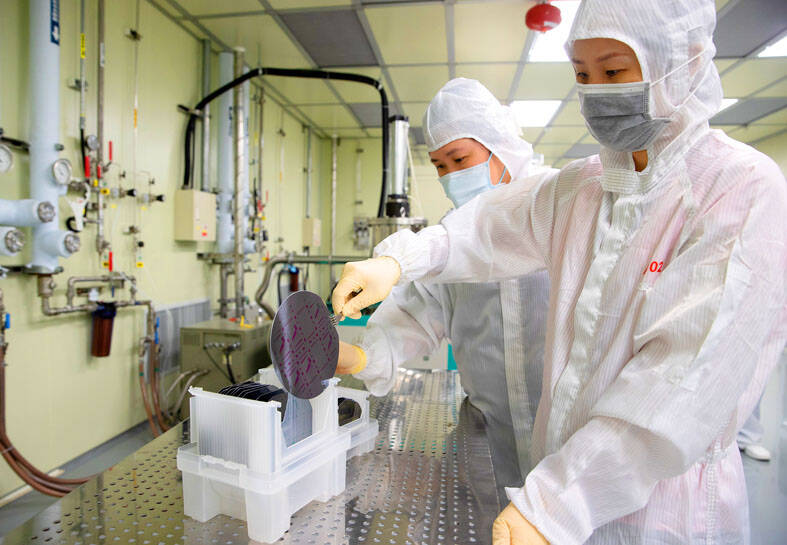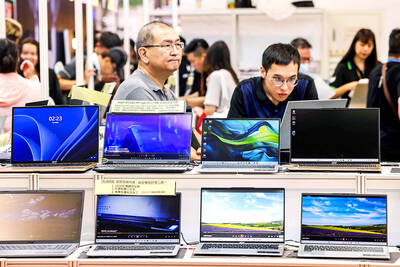Taiwan’s manufacturing output last quarter rose 3.75 percent year-on-year to NT$4.36 trillion (US$139.88 billion), thanks to launches of new mobile devices by major brands, as well as the effects of emerging technologies and digital transformation business opportunities, the Ministry of Economic Affairs said on Friday.
Manufacturing output grew annually for an eighth straight quarter last quarter, but the increase paled in comparison with 13.57 percent growth to NT$4.51 trillion in the second quarter, which the ministry attributed to poor market conditions in traditional industries, as well as equipment maintenance and reduced production in the chemical and steel industries.
The increase last quarter was led by the electronic components industry — the manufacturing sector’s most important segment — which posted a jump of 11.9 percent to NT$1.39 trillion, the highest quarterly level on record, the ministry said.

Photo: CNA
Chip production increased 43.83 percent to NT$784.6 billion, the highest for a single quarter, as semiconductor companies benefited from rising demand for chips used in high-performance computing and automotive electronics, the ministry said.
As international tech brands are planning to launch new products by the end of the year, chipmakers profited from a stocking effect in the third quarter that also drove semiconductor output, the ministry added.
The computer, electronics and optical components industries accelerated production in the third quarter on the back of robust demand for data center-related equipment, while a major improvement in key components boosted production of servers and networking equipment, the ministry said.
Their output grew 26.54 percent year-on-year to NT$301.5 billion, compared with an expansion of 16.04 percent to NT$256.2 billion in the second quarter, it added.
However, LCD panel makers continued to register declining output due to weakening demand for consumer electronics, with their production value last quarter decreasing 54.58 percent to NT$110.6 billion following an annual drop of 33.7 percent to NT$157.3 billion in the previous quarter, the ministry said.
In the traditional industries, producers of chemical materials and base metals last quarter posted a decline in output of 18.54 percent and 19.31 percent respectively to NT$427.58 billion and NT$407.9 billion from a year earlier, as weakening demand in the end market led to inventory depletion in the supply chain and reduced production by major manufacturers, the ministry said.
Suppliers of petroleum and coal products saw their output increase 47.52 percent to NT$317.3 billion as global crude oil prices remained high and firms were committed to expanding exports, but last quarter’s growth slowed in comparison with an annual increase of 73.28 percent to NT$346.8 billion in the second quarter, the ministry said.
The machinery equipment industry’s output growth slowed to 3.41 percent last quarter, from the previous quarter’s 5.91 percent, as increased orders for semiconductor equipment were offset by reduced production of woodworking machinery and electric hand tools due to declining US and European orders.
Nonetheless, the output of vehicle parts grew 11.76 percent last quarter, compared with an annual decline of 5.84 percent in the second quarter, as domestic automakers benefited from a domestic sales boom, while component shortages gradually eased.
The ministry said it remains positive about growth momentum in the manufacturing sector, which is expected to be buoyed by demand for new consumer electronics and emerging technologies such as 5G, high-performance computing and automotive electronics.
However, global inflation and monetary tightening by central banks, as well as the war in Ukraine and restrictive COVID-19 measures in China, could continue to weigh on global economic growth and affect local manufacturing output, it said.

TECH TITAN: Pandemic-era demand for semiconductors turbocharged the nation’s GDP per capita to surpass South Korea’s, but it still remains half that of Singapore Taiwan is set to surpass South Korea this year in terms of wealth for the first time in more than two decades, marking a shift in Asia’s economic ranks made possible by the ascent of Taiwan Semiconductor Manufacturing Co (TSMC, 台積電). According to the latest forecasts released on Thursday by the central bank, Taiwan’s GDP is expected to expand 4.55 percent this year, a further upward revision from the 4.45 percent estimate made by the statistics bureau last month. The growth trajectory puts Taiwan on track to exceed South Korea’s GDP per capita — a key measure of living standards — a

READY TO HELP: Should TSMC require assistance, the government would fully cooperate in helping to speed up the establishment of the Chiayi plant, an official said Taiwan Semiconductor Manufacturing Co (TSMC, 台積電) yesterday said its investment plans in Taiwan are “unchanged” amid speculation that the chipmaker might have suspended construction work on its second chip packaging plant in Chiayi County and plans to move equipment arranged for the plant to the US. The Chinese-language Economic Daily News reported earlier yesterday that TSMC had halted the construction of the chip packaging plant, which was scheduled to be completed next year and begin mass production in 2028. TSMC did not directly address whether construction of the plant had halted, but said its investment plans in Taiwan remain “unchanged.” The chipmaker started

MORTGAGE WORRIES: About 34% of respondents to a survey said they would approach multiple lenders to pay for a home, while 29.2% said they would ask family for help New housing projects in Taiwan’s six special municipalities, as well as Hsinchu city and county, are projected to total NT$710.65 billion (US$23.61 billion) in the upcoming fall sales season, a record 30 percent decrease from a year earlier, as tighter mortgage rules prompt developers to pull back, property listing platform 591.com (591新建案) said yesterday. The number of projects has also fallen to 312, a more than 20 percent decrease year-on-year, underscoring weakening sentiment and momentum amid lingering policy and financing headwinds. New Taipei City and Taoyuan bucked the downturn in project value, while Taipei, Hsinchu city and county, Taichung, Tainan and Kaohsiung

Micro-Star International Co (MSI, 微星科技) is expanding notebook computer production in India after partnering with Indian electronics maker Syrma SGS Technology Ltd late last year, as the Taiwanese company seeks to tap into the local market. MSI also plans to manufacture some of its new gaming PCs powered by Nvidia Corp’s RTX 50 graphics cards in India, while adding more advanced and design-focused PCs and notebooks at Syrma’s plant in Chennai, a source told the Taipei Times yesterday on condition of anonymity. MSI’s deployment in India is driven not only by cost advantages, but also by India’s rapidly expanding consumer market and